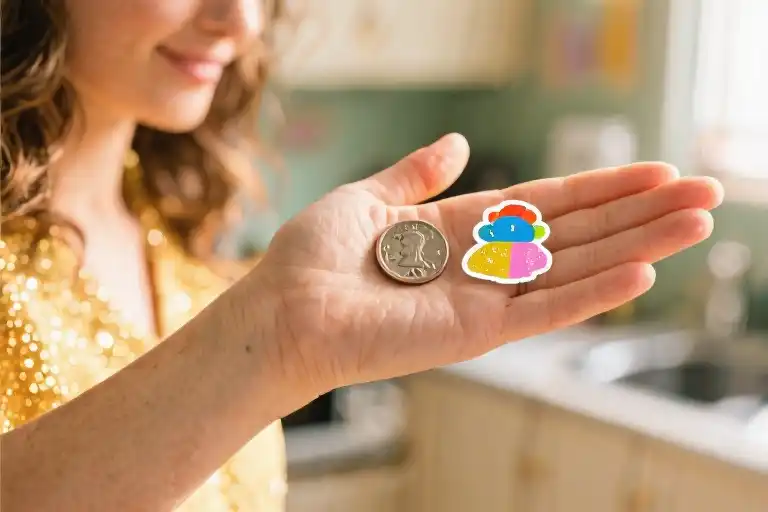The moment my fingers brushed against those cold coins in my husband’s palm, I felt my 4-year-old’s small hand suddenly cover mine. His tiny fingers were warm, sticky with afternoon snack residue, yet their weight carried a question heavier than any grocery bill. ‘Mommy needs money again?’ he whispered, his breath smelling of apple slices and innocent curiosity.
That’s when I understood true poverty isn’t measured by wallet thickness, but by the thickness of your voice when you must ask. Again. For the milk. For the light bill. For the shoes he’d outgrown by Tuesday.
Stay-at-home parent struggles often hide in these microfractures of dignity. The invisible labor of caregiving fills every waking minute – sorting socks with military precision, negotiating naptimes like a UN diplomat, remembering which stuffed animal is tonight’s ’emotional support giraffe.’ Yet when society reduces your worth to ‘Did you earn this coin today?’, even love can’t always cushion the fall.
My son saw it first. Children always do. They notice when your smile doesn’t reach your eyes during playdough time. They sense the hesitation before you say ‘Let’s check with Dad’ about museum tickets. Their developing minds map our emotional load with terrifying accuracy – studies show preschoolers detect parental stress with 78% precision, their little radars picking up what partners and neighbors miss.
I wasn’t lazy. The mountain of washed onesies proved that. I wasn’t ungrateful either – my heart swelled watching my toddler ‘read’ to his stuffed animals using my inflections. But in the quiet between bedtime stories and dawn feedings, I’d trace the cracks in my identity like braille. Who was I beyond the lunchboxes packed and scraped knees kissed? Where did ‘me’ exist in this beautiful, exhausting constellation of their needs?
The emotional toll of parenting often whispers loudest in these coin-handoff moments. That metallic clink of dependence echoes through playrooms and pediatrician visits, through school forms listing ‘Occupation: None.’ Yet within this vulnerability lies our secret strength – the ability to transform grocery runs into treasure hunts, laundry piles into cloud kingdoms. Our children learn resilience from watching us make magic from mundane, dignity from difficult conversations.
Tomorrow, I’ll still need to ask. But I’ll also point out how sunlight makes rainbows in dish soap bubbles, teaching my son to find beauty alongside life’s necessary asks. The coins matter, but not as much as what we build with them – a home where love outweighs lack, where small hands learn that worth isn’t minted by paychecks but measured in care given and character grown.
The Weight of Invisible Labor
The alarm never rings in my world. It’s replaced by the soft whimper of a toddler at 5:37 AM, signaling the start of another day where time stretches yet somehow disappears. Yesterday’s tally glares at me from the kitchen chalkboard – 32 completed tasks that left no trace except the exhaustion behind my eyes. From changing the third diaper before sunrise to singing lullabies through my own sleep deprivation at midnight, every action dissolved into the fabric of our home like sugar in tea.
Physical exhaustion announces itself with concrete symptoms: the persistent ache between my shoulder blades from carrying a growing child, the papery texture of hands that have spent too long in dishwater, the faint tremor in my legs after hours of bouncing a colicky baby. Yet it’s the spiritual emptiness that leaves deeper marks – the unsettling quiet between tasks when I realize no adult has spoken my name in hours, the way my thoughts scatter like dropped buttons when I try to remember the last uninterrupted idea I had.
Consider the anatomy of one ordinary hour:
- 06:15: Extract toddler fingers from cat’s fur (again)
- 06:22: Negotiate breakfast preferences (“No green plates!”)
- 06:35: Wipe yogurt off eyebrows (mine and his)
- 06:47: Discover half-chewed toast behind couch cushions
Each item seems insignificant until multiplied across weeks, until you’re folding tiny socks at midnight wondering why your college degree gathers dust while you Google “how to remove Play-Doh from upholstery.” The mental load manifests in peculiar ways – catching myself whispering grocery lists during pediatrician visits, or realizing I’ve absentmindedly rocked back and forth while standing in line at the bank like a human metronome set to the rhythm of caretaking.
What makes this exhaustion particularly insidious is its invisibility. Office workers have completed projects and closed tickets; artists have canvases to show for their labor. My productivity evaporates the moment it’s achieved – cleaned rooms become messy, fed children grow hungry again, the beautiful silence after naptime inevitably fractures into fresh demands. The cycle resembles Sisyphus pushing his boulder, except my mountain is made of laundry and my boulder has sticky hands asking for snacks.
Yet within this relentless routine exist moments of unexpected grace: sunlight catching soap bubbles in a perfect rainbow, the weight of a sleeping child’s head fitting perfectly against my shoulder, the quiet satisfaction when the pediatrician notes his impressive vocabulary. These become the spiritual counterweights to physical fatigue, the hidden exchange rate that makes the economy of caregiving balance – if only temporarily.
Perhaps the greatest challenge lies in the cognitive dissonance of loving this life while sometimes resenting its constraints. The same hands that gently button overalls also clench in frustration when naptime collapses; the voice that sings silly songs later snaps over spilt milk. This emotional whiplash forms the silent undercurrent of stay-at-home parenting – the unspoken truth that devotion and depletion often share the same heartspace.
Tomorrow’s list will look much the same, but I’m learning to measure productivity differently. Not in checked-off tasks, but in the warmth of small hands trusting mine to fix their world; not in promotions earned, but in the gradual mastery of translating tears into solutions. The vacuum of busyness still sometimes swallows my sense of self, but now I recognize the signs earlier – when my laughter sounds a bit too sharp, when I find myself staring at the spice rack wondering what saffron tastes like alone. These become my signals to pause, breathe, and remember that even invisible labor leaves imprints on the souls it nurtures.
The Little Observers
Children see everything. They notice the way your voice tightens when checking the bank balance, the hesitation before asking for grocery money, the way you fold receipts into tiny squares as if trying to shrink the numbers. My son developed a game last winter that stopped me cold – he’d line up his stuffed animals and solemnly distribute plastic coins, mimicking my monthly budget meetings with his father.
Research from the University of Washington shows preschoolers can accurately detect parental stress 78% of the time, often before adults recognize it themselves. Their small hands become emotional seismographs, picking up tremors we think we’ve hidden beneath folded laundry and meal prep routines. My boy didn’t understand compound interest or household cash flow, but he’d developed an entire pretend economy based on the tension he sensed during our money conversations.
These tiny anthropologists study us with devastating precision. They catalog:
- The way we breathe through requests for “just $20 more”
- Micro-expressions when comparing other families’ vacations
- The ritual dance of justifying every Target run
What startled me wasn’t his imitation of financial transactions, but the caregiving script he’d added. His teddy bear would pat the other toys’ heads while distributing coins, exactly mirroring how I’d stroke his hair during difficult money talks – as if physical comfort could soften economic discomfort.
Three warning signs your child senses financial stress:
- Play Patterns – Dolls having “serious grown-up talks” or toys being “too busy” to play
- Unexpected Generosity – Offering their piggy bank savings unprompted
- Hyper-Observation – Noticing which parents drive newer cars or bring better snacks
We imagine we’re shielding them, but children interpret the world through our unconscious cues. The crack in my carefully constructed “everything’s fine” facade first appeared when my preschooler started “tipping” waitresses with leaves from our backyard, having internalized that money equals appreciation but lacking access to the real currency.
This chapter isn’t about family finance strategies (those come later), but about confronting an uncomfortable truth: our children often serve as mirrors reflecting anxieties we haven’t fully acknowledged ourselves. That plastic coin game became my wake-up call to address not just household budgeting, but the emotional legacy we’re creating around money, worth, and visible/invisible labor.
Tomorrow: How we rebuilt our family’s financial language (and why it started with abolishing “Mommy’s allowance” from our vocabulary).
The Shame Economy: When Asking for Money Feels Like an Apology
The coins always felt heavier than they should. Not in weight, but in meaning. That moment when my husband would hand me cash for groceries—his fingers briefly brushing against my palm—carried more emotional gravity than any bank transaction ever could. Our toddler once asked me why I always said ‘sorry’ when asking Daddy for money. That’s when I realized: I’d perfected the art of the double apology. ‘Sorry to ask… Thank you for giving…’ as if my needs were an imposition rather than a shared responsibility.
The Hidden Tax of Unpaid Labor
Research from the UN shows women perform 76% of total unpaid care work globally—equivalent to $11 trillion in economic value. Yet when standing in our own kitchens asking for household funds, these statistics evaporate. The mental load of remembering milk expiration dates doesn’t translate into financial authority. The emotional labor of soothing tantrums carries no monetary premium. We become walking contradictions: simultaneously indispensable and financially invisible.
Three distinct shame patterns emerge:
- The Preemptive Apology: ‘I know it’s a lot, but…’
- The Productivity Report: Listing completed chores as justification
- The Self-Deprecation: ‘I’ll try to make it last longer this time’
Rewriting the Financial Script
The breakthrough came when we implemented these four communication tools:
1. The Family CFO Meeting
- Every Sunday coffee time dedicated to household finances
- Visual budget board using color-coded magnets (our preschooler loved ‘helping’)
2. The Autonomy Fund
- Fixed monthly amount transferred automatically to my personal account
- No explanations needed—whether for lattes or life coaching sessions
3. Value Visualization
- Created a ‘What My Work is Worth’ poster using salary data for:
- Private chef ($68,000/year)
- Housekeeper ($35,000)
- Child development specialist ($52,000)
4. The Appreciation Adjustment
- Replaced ‘thanks for the money’ with ‘thanks for valuing my contributions’
- Shifted focus from gratitude for cash to recognition of worth
When Coins Become Mirrors
That day my child placed a sticker next to each coin in my wallet marked ‘Mama’s work stars,’ something fundamental changed. The shame economy thrives in isolation—it withers when brought into daylight. Financial dependence doesn’t have to mean emotional dependence. By naming the patterns and creating new rituals, we transformed money conversations from moments of lack to celebrations of mutual contribution.
Tonight’s small victory: When my spouse asked if I needed grocery money, I simply said ‘Yes’—no apologies, no justifications. The silence afterward felt like progress.
Finding Zen in the Laundry Pile
There’s a particular kind of magic that happens when sunlight hits freshly washed cotton – those fleeting moments when folding towels becomes less about household chores and more about creating order from chaos. This is where I discovered my “laundry basket philosophy,” a simple system that transformed one of my most tedious tasks into pockets of peace.
The Two-Zone Approach
Task Zone:
- The left side of the basket holds items needing immediate attention: school uniforms for tomorrow, your partner’s work shirts, the baby’s burp cloths.
- These get folded with efficiency, measured movements that follow muscle memory perfected over hundreds of repetitions.
Flow Zone:
- The right side reserves space for mindfulness practice:
- That linen dress with embroidery you’ll trace with your fingertips
- Your toddler’s impossibly small socks that still carry the scent of baby shampoo
- The quilt grandma stitched, its threads holding generations of stories
Why This Works
- Dual Productivity: The physical act of separating items creates psychological boundaries. You accomplish necessary work while carving out space for emotional restoration.
- Micro-Mindfulness: Unlike meditation apps requiring 10-minute commitments, these are 30-second pauses naturally embedded in existing routines. The texture of terrycloth becomes your focus object.
- Value Reinforcement: Handling family possessions with intention reinforces why this work matters – not just maintaining a household, but curating the artifacts of your shared life.
Reader Invitation: Share Your 3-Minute Rituals
We’re collecting these tiny oases of calm – the small ways caregivers reclaim moments for themselves:
- Stephanie’s ritual: “I measure coffee beans by sound rather than scoop. The rattle against the glass carafe is my morning metronome.”
- Marcus’ ritual: “After strapping the twins into their car seats, I take exactly three deep breaths smelling the leather seats before starting the engine.”
(Leave your ritual in the comments – we’ll feature standout submissions in next month’s follow-up piece.)
The Bigger Picture
This isn’t about “enjoying chores” – it’s about recognizing that caregiving contains multitudes. The same hands that scrub puree off walls can pause to appreciate how sunlight transforms a soap bubble into a prism. The mental load of parenting remains heavy, but we can learn to set it down briefly, if only to feel the weight of a well-loved sweater in our palms before continuing.
Tomorrow’s experiment: When hanging wet clothes, identify one item whose texture pleases you. Let the clothespin wait while you register this sensory detail. This isn’t wasted time – it’s the quiet rebellion of a caregiver claiming back moments of awareness.
The Coin and the Sticker
My palm holds two things this evening: a cold coin fresh from my husband’s wallet, and a sparkly dinosaur sticker pressed there by small fingers. The metallic weight pulls downward while the sticker’s edges catch the kitchen light, scattering prismatic dots across the counter I wiped clean thirty-seven minutes ago.
This is the sacred contradiction of caregiving – the simultaneous burden and blessing that lives in every stay-at-home parent’s hands. That coin represents all the invisible labor of motherhood we never invoice, all the grocery runs and pediatrician visits and sock-matching marathons that society still struggles to quantify. The sticker? That’s the other currency – the one that appears in sticky-fingered installments throughout the day, paying me in pure wonder when my toddler discovers rainbows in soap bubbles.
The alchemy happens in the overlap – in learning to see financial dependence and spiritual abundance occupying the same space. I used to hide the coins quickly, shoving them in my pocket like contraband. Now I let them linger alongside the artwork, watching how the sticker’s glitter sticks to the quarter’s ridges. This is my life’s work made visible: the practical and the poetic, the transactional and the transcendent.
Tomorrow morning, when I make coffee like I have 2,190 mornings before this one, I’ll pause at the steam-fogged window. Instead of immediately wiping it clear, I’ll trace one small star in the condensation – a five-second ritual to reclaim a moment as mine. This is how we survive the emotional toll of parenting: not through grand gestures, but through these microscopic acts of resistance against total self-erasure.
Three ways to find your star moment today:
- Let your child decorate your shopping list before you request grocery money
- Play your favorite song while folding laundry (yes, out loud)
- Keep one coffee sip unscheduled – drink it sitting down
My value isn’t measured in coins or stickers, but in the quiet courage to hold both without apology. The kitchen light keeps dancing across that dinosaur’s scales as I finally put the coin in the mason jar we use for parking meters. The sticker stays right where it is – a glittering reminder that some compensations transcend economics.





